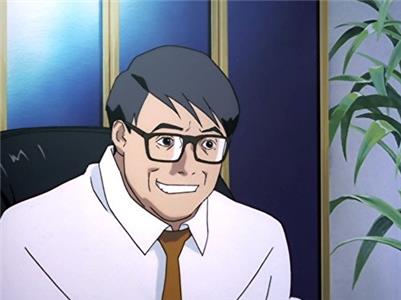Strange events begin to occur as a withdrawn girl named Lain becomes obsessed with interconnected virtual realm of "The Wired".
Serial Experiments Lain Online

A week after Chisa committed suicide, her classmates begin to receive emails from her. Hearing rumors fly at school, a quiet withdrawn girl named Lain goes home that day, turns on her dusty Navi computer for the first time and has a conversation with the dead girl. Chisa's message reads that she killed herself because she didn't need her body anymore, and she now exists in The Wired. When Lain asks why someone would do something like that she gets a response: "Because God is here".
| Series cast summary: | |||
| Kaori Shimizu | - | Lain Iwakura 13 episodes, 1998 | |
| Bridget Hoffman | - | Lain Iwakura 13 episodes, 1998 | |
| Dan Lorge | - | Additional Voices 13 episodes, 1998 | |
| Randy McPherson | - | Additional Voices / - 13 episodes, 1998 | |
| Ali Moriizumi | - | DJ (Present Day announcer) 13 episodes, 1998 | |
| Ayako Kawasumi | - | Mika Iwakura 12 episodes, 1998 | |
| Yôko Asada | - | Arisu Mizuki 12 episodes, 1998 | |
| Patricia Ja Lee | - | Mika Iwakura 12 episodes, 1998 | |
| Emilie de Azevedo Brown | - | Arisu Mizuki 11 episodes, 1998 | |
| Chiharu Tezuka | - | Reika Yamamoto 10 episodes, 1998 | |
| Manabi Mizuno | - | Juri Kato 10 episodes, 1998 | |
| Alexis A. Edwards | - | Juri Kato 10 episodes, 1998 | |
| Lenore Zann | - | Reika Yamamoto 10 episodes, 1998 | |
| Ryûnosuke Ôbayashi | - | Yasuo Iwakura 10 episodes, 1998 | |
| Mary Elizabeth McGlynn | - | Lain's NAVI / - 9 episodes, 1998 | |
| Barry Stigler | - | Yasuo Iwakura 10 episodes, 1998 | |
| Rei Igarashi | - | Miho Iwakura 8 episodes, 1998 | |
| Brianne Brozey | - | Taro 8 episodes, 1998 | |
| Petrea Burchard | - | Miho Iwakura 8 episodes, 1998 | |
| Keito Takimoto | - | Taro 8 episodes, 1998 | |
| Shô Hayami | - | Deus / - 7 episodes, 1998 | |
| Takumi Yamazaki | - | Lin Sui-Xi / - 7 episodes, 1998 | |
| Kirk Thornton | - | Deus / - 7 episodes, 1998 | |
| Kuniko Yoshioka | - | S 7 episodes, 1998 | |
| Jamieson Price | - | Karl Haushofer / - 7 episodes, 1998 | |
| Jôji Nakata | - | Karl Haushofer / - 6 episodes, 1998 | |
| Bob Buchholz | - | Lin Sui-Xi / - 6 episodes, 1998 | |
| Sandy Fox | - | Myu-Myu / - 7 episodes, 1998 | |
| Sora Tôma | - | Masayuki 6 episodes, 1998 | |
| Yuki Yamamoto | - | Myu-Myu 7 episodes, 1998 | |
In Layer:04, the boy playing Phantoma asks Lain if she's a PK. A PK is a "player killer", a term originating from the early days of online MUD (Multi User Dungeon) games. A PK is a player who kills other players.
There are numerous references to Macintosh and Apple Computers: The phrase "To Be Continued", with a colored "Be" is shown at the end of most of the episodes. This is a reference to BeOS, whose logo has similar coloring. The Be company was founded by Jean-Louis Guasse, a former Apple executive. The Navis use an operating system named Copeland, which was the codename for Apple's MacOS 8. Navi's operating system has a graphical user interface (GUI) similar to that of MacOS. Arisu's Navi resembles the original Apple iMac. The series slogan "Close this world. Open the NeXT" is a reference to the NeXT company, founded by Steve Jobs in the late '80s and purchased by Apple Computer in December 1996. All of the Navis shown in the series use one-button mice as Macintosh computers do. The electronic voice heard saying the episode titles is the "Whisper" voice from the MacOS Speech Control Panel, a program that permits text-to-speech. The child's Navi that Lain used to use was modeled after the 20th Anniversary Macintosh. The HandiNAVI, the handheld computers which both Lain and Arisu used was based off the Apple Newton, the first PDA. Navis and Macintoshes are both built by companies named after fruit, Tachibana (a type of orange) and Apple, respectively.
The Psyche processor is pronounced as "psukhe", the original Greek form of the word.
The girl in the "Devices" segments is the voice of Lain herself, Kaori Shimizu. Also, Lain's character design was based in part from Ms. Shimizu's physical appearance.
The two MIBs actually have names. The name of the short, Asian MIB is Lin Sui-Xi. The name of the tall, Caucasian MIB is Karl Haushofer. His character was the only one to be addressed by name during the series.
The geek with the wearable computer is accessing a page that's utilizes Apple Computer's Hot Sauce web browser plug-in for 3D space navigation.








User reviews